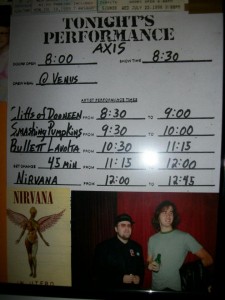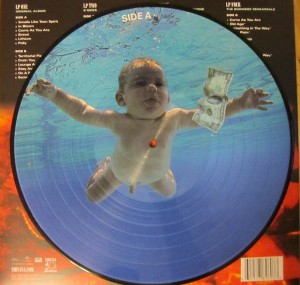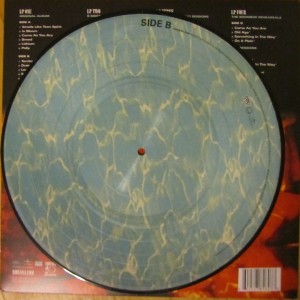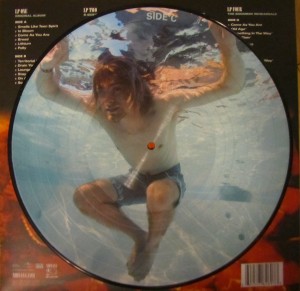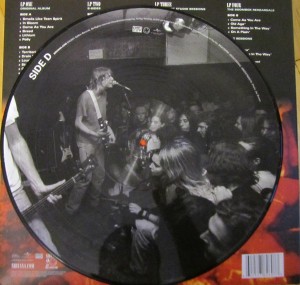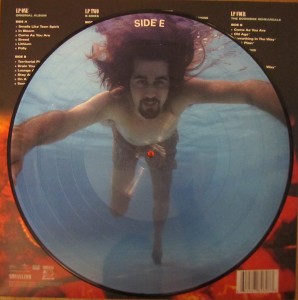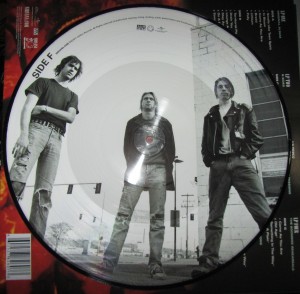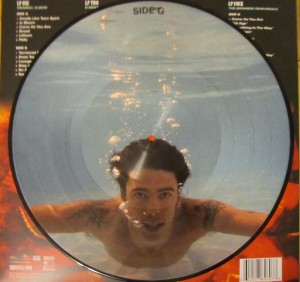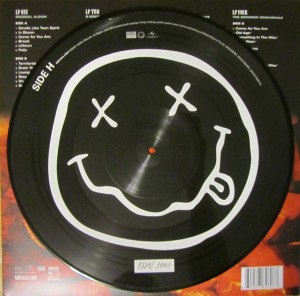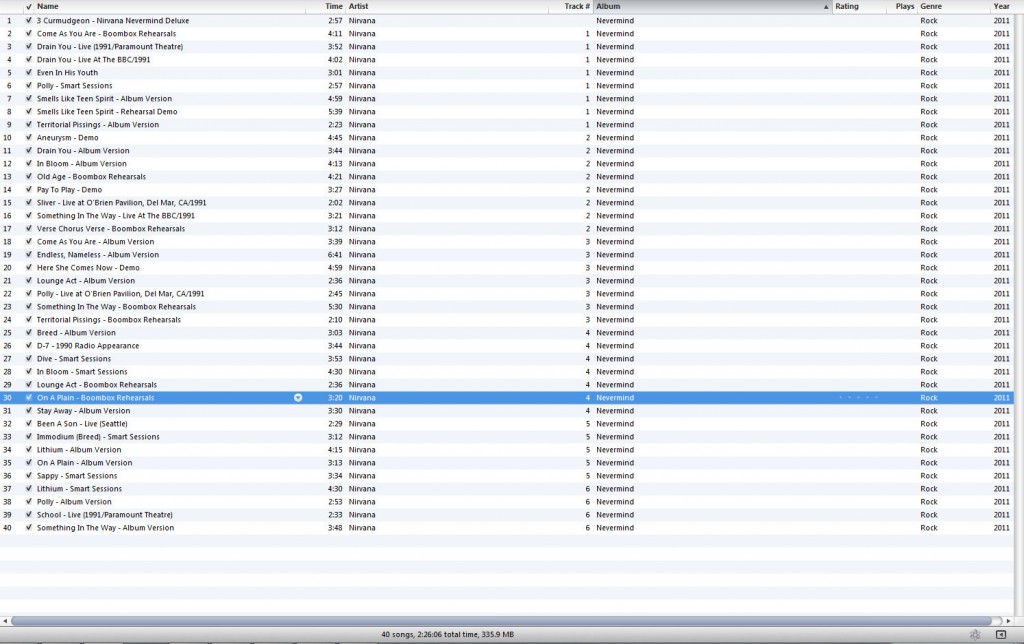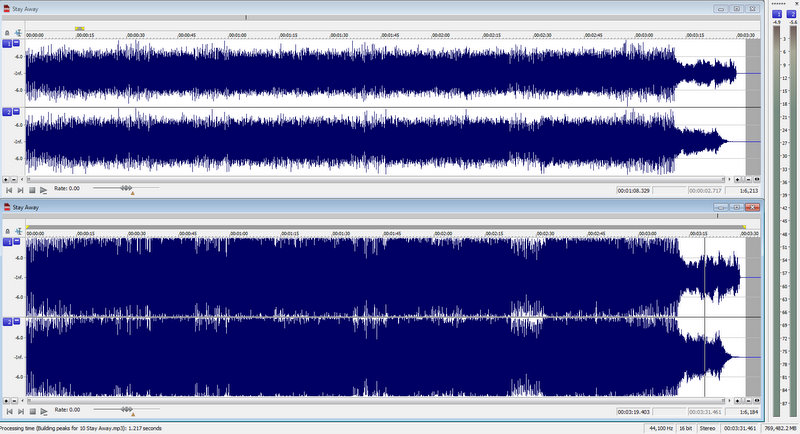Update 10/10/11: Bob Ludwig’s response to my criticism over his horrible mastering job.
To be honest, I was a little shocked at the enthusiastic response that I got for my write-up on the Super Deluxe edition of Nevermind. I didn’t expect that anyone aside from me and maybe a couple hundred other people would be worrying about the audio quality of the Nirvana remasters. I was pleasantly surprised to see the post kind of go viral, and not just because it gave me a record number of hits. I was happy to see that people are starting to care about audio quality, about the Loudness War, and about the preservation of important works of art like Nevermind.
That’s probably why a lot of music fans and collectors are buying vinyl these days, because a lot of people think that it’s physically impossible for vinyl to be “too loud.” The grooves on a vinyl record can’t reach the volume that a CD can. Because of that, many people, myself included, held out hope that  the Deluxe 4LP version of Nevermind might be worth getting.
But there’s nothing sacred about vinyl that makes it immune to a shit remaster. If something is over-compressed and too loud on CD and they use the same master for the LP, it might not sound as bad, but it sure as hell isn’t going to sound good. For the Nevermind vinyl to stand any chance, it would have to be taken from a different master, one made for vinyl.
So was it?
Well, before I get into that I feel like I should put out a few disclaimers.
First, I am not an audio engineer and I do not consider myself an audiophile. I’m just an angry dude with a turntable who appreciates music. While I’ve been writing about music for over a decade, I rarely delve into the technical aspects of music production. So if I use any technical terms incorrectly, please correct me.
Second, vinyl is a fickle beast. You could record the same record on 10 different turntables and it will probably sound a little different on each one. When recording a vinyl to a computer, the turntable, stylus, cartridge, pre-amp and soundcard each play a considerable factor in the quality of the recording. If you do your own tests on your own copy of Nevermind, your results may vary, but probably not enough for it to make a substantial difference.
Finally, this is going to be long. But if you want the short version here you go:Â Stay Away.
Now for the long version…
Let’s get the small stuff out of the way. The vinyl version only comes in one flavor, the Deluxe Edition. This version has 40 tracks, which include the original album in full; a collection of B-sides and live cuts; the Smart Studio Sessions; the Boombox Rehearsals; and the BBC sessions. It does not include the Devonshire mixes, nor does it have the live CD and DVD that are on the Super Deluxe version. Although I understand that putting all of that on vinyl would be a bit expensive, it’s kind of a drag.
The packaging is decent, with some nice artwork included, but no special linear notes are included.
The LPs come in individual static-free dust covers, so while they may sound like junk, at least they won’t get dusty. And they’re each a hefty 180 grams, so if push comes to shove, you can use them in case of a zombie invasion.
To judge the audio quality of each LP, I recorded them using my Audio-Technica ATLP120 Turntable (my Technics is in the shop) that is equipped with an Ortofon Arkiv stylus and cartridge. The turntable is connected to an ART USB PhonoPlus Pre-amp, which is plugged in to my computer via USB. The recordings were made using Audacity and any screenshots taken are in Sony Sound Forge Audio Studio 10. No processing was done on any of the files. I recorded each record at the the loudest possible volume that didn’t create clipping.
For the purposes of this review I will be looking at just two songs; “Aneurysm” and “Curmudgeon.” I chose these because they are two of my favorite Nirvana songs, and sadly, the two that suffer the most from audio compression in my opinion.
Here’s a comparison of the waveforms for “Aneurysm.” The top is the original taken from the Japanese  Hormaning EP. The middle is from the the  Nevermind vinyl edition. The bottom is from the Nevermind Super Deluxe CD :
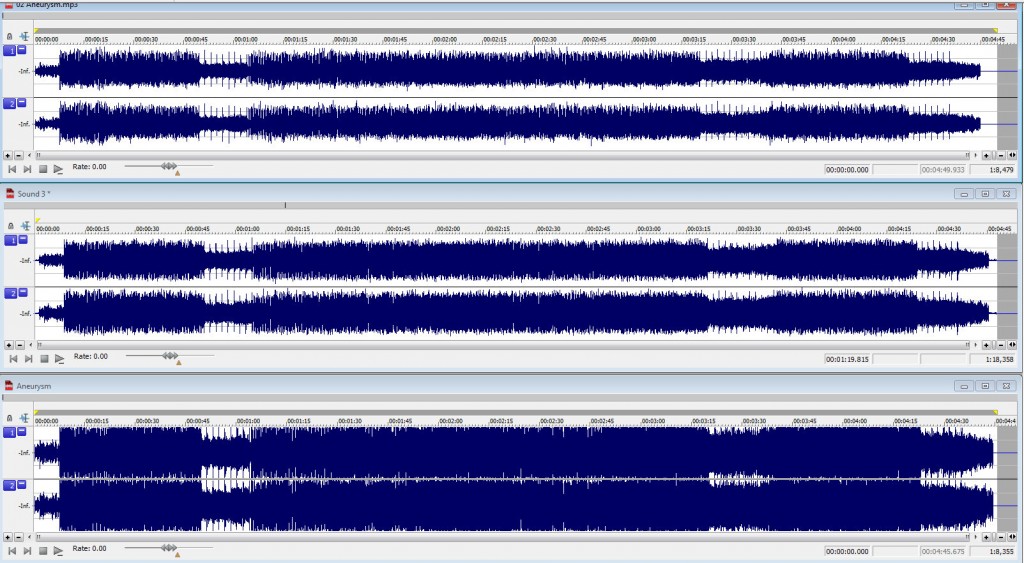
You can click on the image to see it bigger.
As you can see, the vinyl version looks better than the remastered CD version, but it still doesn’t sound as good as the original version taken from the Hormoaning EP. It’s still too loud.
And that’s not just my subjective view, I can prove it by comparing the dynamic ranges of each version.
Dynamic range is the difference between the softest and loudest sounds in a recording. Dynamic range is a good thing. All music, even heavy metal and hard dance, needs dynamic range. It’s what gives music life, energy and power. Without it, a song can turn into noise. Generally speaking, the higher a song’s dynamic range, the better.
Using the TT Dynamic Range Meter, I measured the dynamic range of each version of “Aneurysm.” Here are the results:
- Hormoaning EP (Original): 12.5
- Remastered Vinyl: 9.7
- Remastered CD: 6.6
The remastered CD loses nearly half of the original’s dynamic range! The vinyl version fairs better, but it still pales compared to the original. And in case you’re wondering, it doesn’t matter what volume I record my vinyl version at, as long as there is no clipping, the dynamic range will not change. I checked.
Now for “Curmudgeon.” The top is the original, taken from the “Lithium” CD single. The middle is from the Nevermind vinyl. The bottom is from the Nevermind CD:
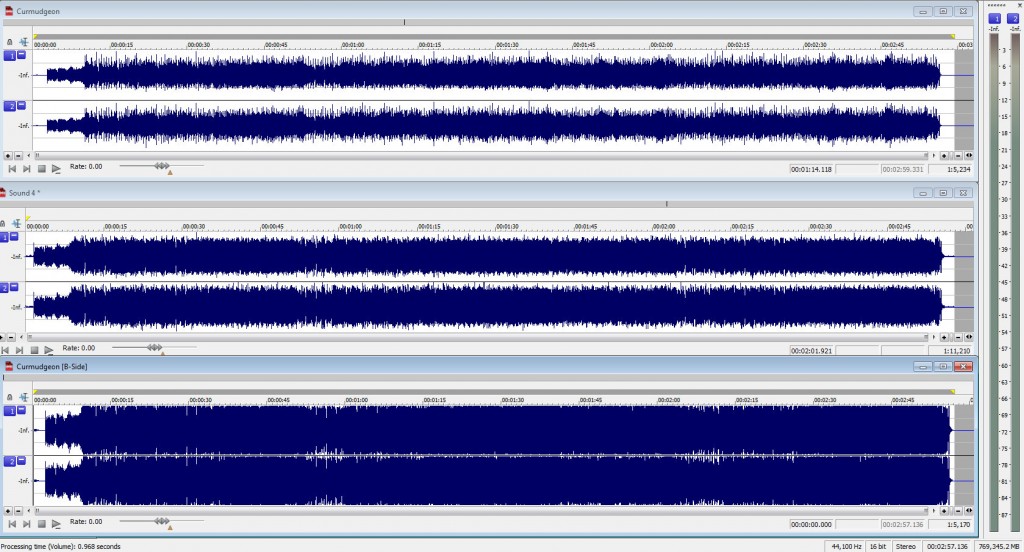
In this one you can even see that the vinyl version loses a lot of the drums in the new mix. No surprises in in the dynamic range either:
- “Lithium” CD Single (Original): 12.5
- Remastered Vinyl: 9
- Remastered CD: 6
I could repeat this for all 40 songs, but I think you get my point. While the vinyl version of the Nevermind remaster is better than the CD version, it was probably taken from the same mix. Both the vinyl and CD versions are so loud that they end up losing subtle nuances and qualities that were in the original mixes, so they are inferior versions of the album. Think about it, to celebrate the 20th anniversary of one of the most important albums of my generation, DGC/Universal purposely went out of their way to make it sound worse.
Assholes.
If you’re new to this whole “Loudness War” thing then you’re probably asking yourself “why the hell would a label go out of their way to make their music sound worse?”
That’s an excellent question. The answer is simple: Because they’re a bunch of fucking morons.
Okay, it’s a little more complex than that. Labels (and sometimes the bands too) like to think that louder = better. They think that if their music is louder than everyone else’s then it will “pop” out at the listener more and create a greater impact. The problem is that they’re wrong. There no correlation between the loudness of a song and its popularity. Additionally, a song that is too compressed will actually sound noticeably worse on the radio.
So actually, it’s not more complex than what I first said; it’s because they’re a bunch of fucking morons.
Never let reason get in the way of business decision though!
When I was doing research for this post I found this video on YouTube. It’s a presentation made by Bob Ludwig at the 2009 Audio Engineering Convention. For those of you who don’t know, Bob Ludwig is a Grammy award-winning audio engineer who has worked with artists like Pearl Jam, Coldplay, The Rolling Stones and hundreds of others. During the presentation he says this:
“If something comes in sounding amazing, a mastering engineer, if they’re any good, will do nothing to it.”
Truer words have never been spoken.
Too bad Bob Ludwig was the person responsible for the Nevermind remaster.
Oh well, whatever. Nevermind.
…
On second thought, no. Fuck that. You should mind. Don’t let them fucking win. I’m not going to. They need to know how much this matters to us.
Bob Ludwig is on Twiter. Tell him what you think about the Nevermind remaster. Let Krist and Dave know too. And the faceless PR blob that runs the Nirvana account. Shit, tell Courtney, it couldn’t hurt. Harass anyone else you can think of who may be responsible for this bullshit. Got the email address or Twitter account of someone in the music business who is promoting this idiotic trend? Share it in the comments. Maybe we can annoy these idiots into taking notice that we don’t want our music ruined anymore.
Tell your friends to do the same. Spread the word. Follow sites and organizations that are fighting this. Visit  Tune Me Up and Justice For Audio. Sign the petition at the Pleasurize Music Foundation that demands music be treated with the respect it deserves.
Music should be this important to you. It should fucking matter. This is something you should care about because if enough people speak up and hit the record companies where it matters (their rapidly shrinking wallets) then they might turn their overcompressed bullshit music down for five seconds and listen to what the fans want.
If not, then they’ll probably end up going out of business. Either way we win.
Nirvana
Aneurysm (Hormoaning Version)
Curmudgeon (Lithium CD Single Version)
Even In His Youth (Hormoaning Version)
For me, these B-sides are as recognizable and as much a part of my teen years as Nevermind proper. I remember borrowing the “Lithium” single from a neighbor after Kurt died and thinking “wow, there are Nirvana songs I don’t own! So cool!” I think I ended up buying the CD off of her so I could keep it. Later that year I went to L.A. with my dad and discovered for the first time the joy of a truly awesome independent record store. There, I bought one of my first LPs (Veruca Salt’s American Thighs, I don’t know why) and my first Japanese import, the Hormoaning EP. I thought it was so cool. Not only was it Nirvana, but it was Japanese! For a grungy teenage nerd into anime that’s two awesome things at once! That’s one thing I miss about the pre-Internet days, it was way easier to be surprised by shit like that.
These are the original versions of the B-sides on the bonus disc of the new Nevermind. Download these versions and listen to these amazing songs as they were meant to be heard.

